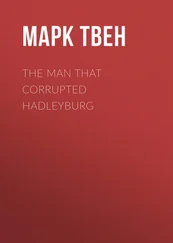Mark Twain - The Man That Corrupted Hadleyburg and Other Stories
Здесь есть возможность читать онлайн «Mark Twain - The Man That Corrupted Hadleyburg and Other Stories» весь текст электронной книги совершенно бесплатно (целиком полную версию без сокращений). В некоторых случаях можно слушать аудио, скачать через торрент в формате fb2 и присутствует краткое содержание. Год выпуска: 2004, Жанр: Классическая проза, Юмористическая проза, на английском языке. Описание произведения, (предисловие) а так же отзывы посетителей доступны на портале библиотеки ЛибКат.
- Название:The Man That Corrupted Hadleyburg and Other Stories
- Автор:
- Жанр:
- Год:2004
- ISBN:нет данных
- Рейтинг книги:4 / 5. Голосов: 1
-
Избранное:Добавить в избранное
- Отзывы:
-
Ваша оценка:
- 80
- 1
- 2
- 3
- 4
- 5
The Man That Corrupted Hadleyburg and Other Stories: краткое содержание, описание и аннотация
Предлагаем к чтению аннотацию, описание, краткое содержание или предисловие (зависит от того, что написал сам автор книги «The Man That Corrupted Hadleyburg and Other Stories»). Если вы не нашли необходимую информацию о книге — напишите в комментариях, мы постараемся отыскать её.
The Man That Corrupted Hadleyburg and Other Stories — читать онлайн бесплатно полную книгу (весь текст) целиком
Ниже представлен текст книги, разбитый по страницам. Система сохранения места последней прочитанной страницы, позволяет с удобством читать онлайн бесплатно книгу «The Man That Corrupted Hadleyburg and Other Stories», без необходимости каждый раз заново искать на чём Вы остановились. Поставьте закладку, и сможете в любой момент перейти на страницу, на которой закончили чтение.
Интервал:
Закладка:
I turned away. I could not listen; I could not look. I did not know whither to go or what to do. Mechanically and without knowing it, I put my eye to that strange instrument, and there was Peking and the Czar's procession! The next moment I was leaning out of the window, gasping, suffocating, trying to speak, but dumb from the very imminence of the necessity of speaking. The preacher could speak, but I, who had such need of words—'And may God have mercy upon your soul. Amen.'
The sheriff drew down the black cap, and laid his hand upon the lever. I got my voice.
'Stop, for God's sake! The man is innocent. Come here and see Szczepanik face to face!'
Hardly three minutes later the governor had my place at the window, and was saying:
'Strike off his bonds and set him free!'
Three minutes later all were in the parlour again. The reader will imagine the scene; I have no need to describe it. It was a sort of mad orgy of joy.
A messenger carried word to Szczepanik in the pavilion, and one could see the distressed amazement in his face as he listened to the tale. Then he came to his end of the line, and talked with Clayton and the governor and the others; and the wife poured out her gratitude upon him for saving her husband's life, and in her deep thankfulness she kissed him at twelve thousand miles' range.
The telelectroscopes of the world were put to service now, and for many hours the kinds and queens of many realms (with here and there a reporter) talked with Szczepanik, and praised him; and the few scientific societies which had not already made him an honorary member conferred that grace upon him.
How had he come to disappear from among us? It was easily explained. HE had not grown used to being a world-famous person, and had been forced to break away from the lionising that was robbing him of all privacy and repose. So he grew a beard, put on coloured glasses, disguised himself a little in other ways, then took a fictitious name, and went off to wander about the earth in peace.
Such is the tale of the drama which began with an inconsequential quarrel in Vienna in the spring of 1898, and came near ending as a tragedy in the spring of 1904.
II
Correspondence of the 'London Times' Chicago, April 5, 1904
To-day, by a clipper of the Electric Line, and the latter's Electric Railway connections, arrived an envelope from Vienna, for Captain Clayton, containing an English farthing. The receiver of it was a good deal moved. He called up Vienna, and stood face to face with Mr. K., and said:
'I do not need to say anything: you can see it all in my face. My wife has the farthing. Do not be afraid—she will not throw it away.'
III
Correspondence of the 'London Times' Chicago, April 23, 1904
Now that the after developments of the Clayton case have run their course and reached a finish, I will sum them up. Clayton's romantic escape from a shameful death stepped all this region in an enchantment of wonder and joy—during the proverbial nine days. Then the sobering process followed, and men began to take thought, and to say: 'But a man was killed, and Clayton killed him.' Others replied: 'That is true: we have been overlooking that important detail; we have been led away by excitement.'
The telling soon became general that Clayton ought to be tried again. Measures were taken accordingly, and the proper representations conveyed to Washington; for in America under the new paragraph added to the Constitution in 1889, second trials are not State affairs, but national, and must be tried by the most august body in the land—the Supreme Court of the United States. The justices were therefore summoned to sit in Chicago. The session was held day before yesterday, and was opened with the usual impressive formalities, the nine judges appearing in their black robes, and the new chief justice (Lemaitre) presiding. In opening the case the chief justice said:
'It is my opinion that this matter is quite simple. The prisoner at the bar was charged with murdering the man Szczepanik; he was tried for murdering the man Szczepanik; he was fairly tried and justly condemned and sentenced to death for murdering the man Szczepanik. It turns out that the man Szczepanik was not murdered at all. By the decision of the French courts in the Dreyfus matter, it is established beyond cavil or question that the decisions of courts and permanent and cannot be revised. We are obliged to respect and adopt this precedent. It is upon precedents that the enduring edifice of jurisprudence is reared. The prisoner at the bar has been fairly and righteously condemned to death for the murder of the man Szczepanik, and, in my opinion, there is but one course to pursue in the matter: he must be hanged.'
Mr. Justice Crawford said:
'But, your Excellency, he was pardoned on the scaffold for that.'
'The pardon is not valid, and cannot stand, because he was pardoned for killing Szczepanik, a man whom he had not killed. A man cannot be pardoned for a crime which he has not committed; it would be an absurdity.'
'But, your Excellency, he did kill a man.'
'That is an extraneous detail; we have nothing to do with it. The court cannot take up this crime until the prisoner has expiated the other one.'
Mr. Justice Halleck said:
'If we order his execution, your Excellency, we shall bring about a miscarriage of justice, for the governor will pardon him again.'
'He will not have the power. He cannot pardon a man for a crime which he has not committed. As I observed before, it would be an absurdity.'
After a consultation, Mr. Justice Wadsworth said:
'Several of us have arrived at the conclusion, your Excellency, that it would be an error to hang the prisoner for killing Szczepanik, instead of for killing the other man, since it is proven that he did not kill Szczepanik.'
'On the contrary, it is proven that he did kill Szczepanik. By the French precedent, it is plain that we must abide by the finding of the court.'
'But Szczepanik is still alive.'
'So is Dreyfus.'
In the end it was found impossible to ignore or get around the French precedent. There could be but one result: Clayton was delivered over for the execution. It made an immense excitement; the State rose as one man and clamored for Clayton's pardon and retrial. The governor issued the pardon, but the Supreme Court was in duty bound to annul it, and did so, and poor Clayton was hanged yesterday. The city is draped in black, and, indeed, the like may be said of the State. All America is vocal with scorn of 'French justice,' and of the malignant little soldiers who invented it and inflicted it upon the other Christian lands.
(1) Pronounced (approximately) Shepannik.
ABOUT PLAY-ACTING
I
I have a project to suggest. But first I will write a chapter of introduction.
I have just been witnessing a remarkable play, here at the Burg Theatre in Vienna. I do not know of any play that much resembles it. In fact, it is such a departure from the common laws of the drama that the name 'play' doesn't seem to fit it quite snugly. However, whatever else it may be, it is in any case a great and stately metaphysical poem, and deeply fascinating. 'Deeply fascinating' is the right term: for the audience sat four hours and five minutes without thrice breaking into applause, except at the close of each act; sat rapt and silent—fascinated. This piece is 'The Master of Palmyra.' It is twenty years old; yet I doubt if you have ever heard of it. It is by Wilbrandt, and is his masterpiece and the work which is to make his name permanent in German literature. It has never been played anywhere except in Berlin and in the great Burg Theatre in Vienna. Yet whenever it is put on the stage it packs the house, and the free list is suspended. I know people who have seem it ten times; they know the most of it by heart; they do not tire of it; and they say they shall still be quite willing to go and sit under its spell whenever they get the opportunity.
Читать дальшеИнтервал:
Закладка:
Похожие книги на «The Man That Corrupted Hadleyburg and Other Stories»
Представляем Вашему вниманию похожие книги на «The Man That Corrupted Hadleyburg and Other Stories» списком для выбора. Мы отобрали схожую по названию и смыслу литературу в надежде предоставить читателям больше вариантов отыскать новые, интересные, ещё непрочитанные произведения.
Обсуждение, отзывы о книге «The Man That Corrupted Hadleyburg and Other Stories» и просто собственные мнения читателей. Оставьте ваши комментарии, напишите, что Вы думаете о произведении, его смысле или главных героях. Укажите что конкретно понравилось, а что нет, и почему Вы так считаете.










